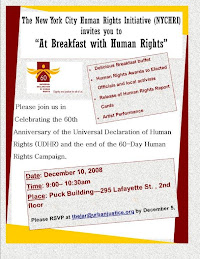By Melissa Hope Ditmore
This December marks the 60th anniversary of the Universal Declaration of Human Rights . The right to livelihood is enshrined in the declaration. I mention this because it is one of the rights most often denied to sex workers.
Around the world, people turn to sex work in the hope that it will enable them to earn a living. But authorities and misguided anti-prostitution policies routinely deny them that right.
The Sex Workers Project at the Urban Justice Center has released two reports highlighting this fact. (See them at here). Sex workers interviewed for these reports described becoming involved in commercial sex for financial reasons, and they described the difficulties faced by unskilled workers, especially transgender workers, in their efforts to earn a living wage.
One of the reports, Behind Closed Doors, quotes one sex worker on her financial aims: “I have goals that change based on what bills need to be paid, what expenses I’ve had, and what my current ‘improve my situation’ goals are.”
In the report Revolving Door, a transgender sex worker describes what she faced when looking for mainstream work: “I want to get a job where I’m respected – basically, where I’m not discriminated against.” Sex workers from other countries explain that they came to the United States to pursue economic opportunities not available in their native lands.
Sex workers support themselves and their families with their income. However, their income, personal safety and human rights are jeopardized by attempts to eliminate sex work, including prohibitions on it.
In some places, the rule of law is absent, which leads to violations of everyone’s rights. In other places like the United States, where sex workers are criminalized, it is difficult if not futile for sex workers to report incidents of violence to the police, because the state and its agents – police and military forces – are the groups most involved in violating sex workers’ human rights.
Sex workers who are brave enough to report violent experiences often find that their complaints are not investigated or even rejected outright. Criminals know they can assault sex workers with impunity because such crimes are highly unlikely to be prosecuted.
Economic motives for sex work combine with these abusive police practices to create higher levels of potential violence against women with few economic opportunities.
All people who press forward with sexual assault cases face intense scrutiny, but in New York State, for example, the law makes it more difficult for people charged with a prostitution-related crime to bring such a case. Right now in New York City, the crackdown has expanded to include even legal forms of sex work.
For example, people who work in venues involving bondage and domination are being targeted in vice raids and being charged with prostitution, even though the work involves no sexual contact with clients. Police go after these people because they are already marginalized as sex workers. Many then plead guilty to crimes they did not commit because taking their cases to trial could result in exposure that risks their future ability to get a job in the mainstream sector.
In fact, that is perhaps the worst consequence of prostitution-related arrests: the barrier to finding other work that the arrest record creates – especially work that offers a living wage.
Sex workers around the world use the slogan “Only rights can stop the wrongs.” On the 60th anniversary of the Universal Declaration of Human Rights, this statement of fact highlights the urgent need for a rights-based policy approach to sex work, as to other social issues.
Melissa Ditmore is a research and advocacy consultant with the Sex Workers Project at the Urban Justice Center.
Monday, October 27, 2008
Subscribe to:
Post Comments (Atom)




No comments:
Post a Comment